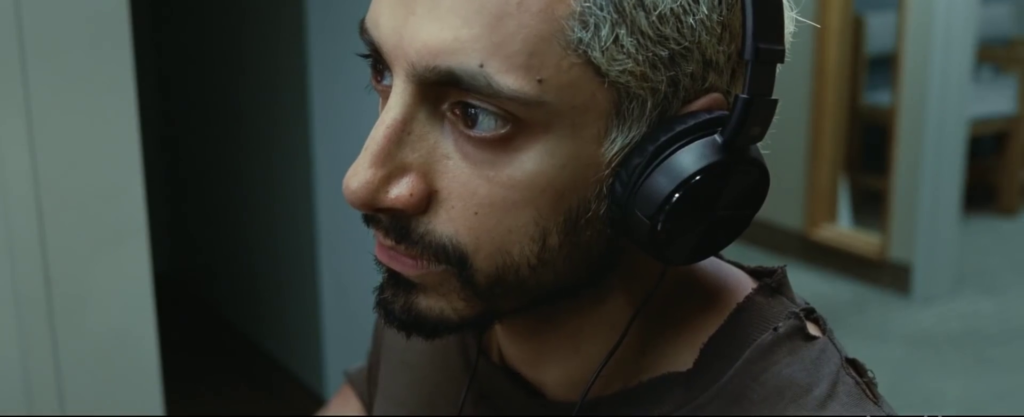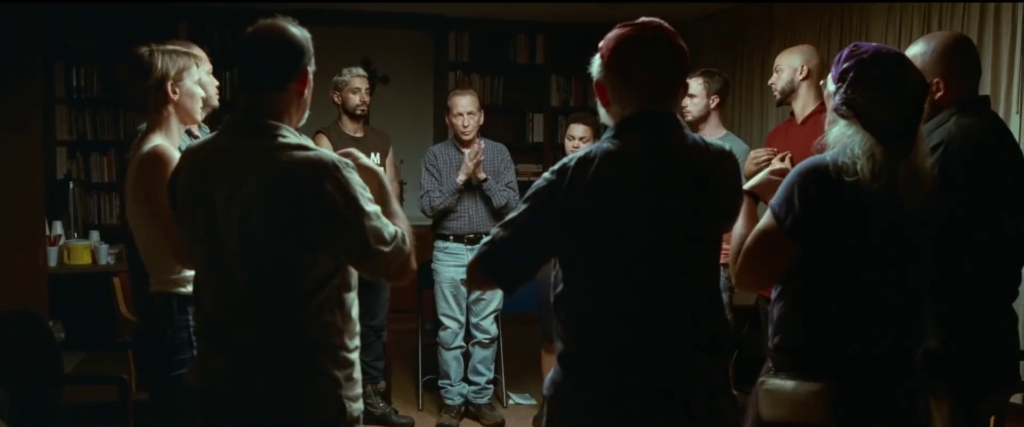
Film Review: Sound of Metal
Written and directed by Darius Marder. US, 2020, 130 minutes.
Now playing at the Kendall Square Cinema. Available with subscription to Amazon Prime beginning December 4.
Loosely based on an unfinished Derek Cianfrance-directed nonfiction film about a heavy-metal drummer coping with profound hearing loss, writer/director Darius Marder’s fiction debut is a model of experiential and empathetic filmmaking. Rather than fall into the swirling pit of sentimentality and patronizing bullshit that plagues many lesser films about grief, addiction, and disability, Sound of Metal prioritizes the emotional and physical reality of its subject above all else, combining an observational view of the deaf community with an immersive portrait of a man caught between loss and recovery.
This first-person focus is perhaps most obvious in the film’s experimental sound design, which often attempts to mimic the experience of deafness. When Ruben (Riz Ahmed) begins to lose his hearing, all the sounds that populate his life, from the whirring of his blender to his girlfriend’s singing, become acutely muffled in the mix. And when he goes to live in a group home for deaf recovering addicts, entire sequences are presented in silence—with captions given for conversations held in spoken English, but not for those in ASL, centering the hearing-impaired viewer and gesturing to Ruben’s own lack of understanding. For the hearing viewer, it’s an experience that vacillates between interesting and frustrating, immersive and jarring; but if you ever get lost in the silence, a discordant note snaps you back to attention sooner than later.
Silence, the film argues, is simply a reality for the deaf, and Ruben must accept that fact to find some version of peace within himself. But before acceptance comes denial, anger, and the rest. Although veteran and group home leader Joe (real-life veteran and ASL advocate Paul Raci) emphasizes his community’s belief that deafness is not a handicap, Ruben grieves for his hearing and the life he had before. For most of the film, he’s incandescent. He smashes up parts of his trailer, cries out in pain, beats a donut into a pulp on his desk.

Ahmed, in his first solo leading role since The Night Of (2016), navigates these scenes of rage with the same physical commitment he brings to the film’s quietest moments. His wailing and gnashing of teeth plays like the natural extension of his pent-up stillness; controlled explosions from a tense, guarded man who needs to know his own limits to survive. With bleached hair and a flurry of tattoos covering his toned chest and back, Ruben is markedly styled like Ryan Gosling’s character in Place Beyond the Pines (2012), another Marder-Cianfrance collab. For them the look might be easy shorthand for a rebel with a traumatic past, but it works on Ahmed perhaps more so than on Gosling, highlighting Ruben’s isolation and pulling visual focus in his group scenes. In turn Olivia Cooke, who plays Ruben’s girlfriend and bandmate Lou, has her eyebrows bleached to match his hair in a mark of punk dispassion—but they do little to hide her expressions of intense distress.
Within its tight script, Sound of Metal does employ some addict-movie tropes. The relationship between Ruben and Joe can sometimes feel like The Karate Kid (1984), and the film’s extended third act seems determined to give easy shape to a process of healing that is rarely straightforward. But rather than force you to the edge of your seat in morbid contemplation—Will he pick up again? Will he reach the brink?—Sound of Metal pulls back and stays by Ruben’s side, granting his search for peace the same high stakes as his physical survival. [★★★★½]
Country Music Concerts Near Me
How To Watch NBA Live Streaming
Cassidy Olsen is a film critic, culture journalist and screenwriter based in Dublin, Ireland.

